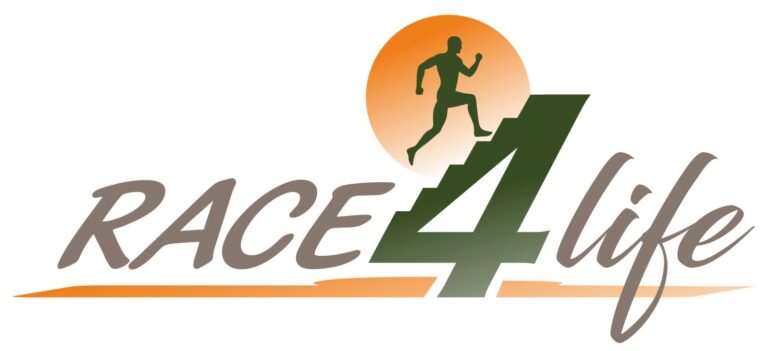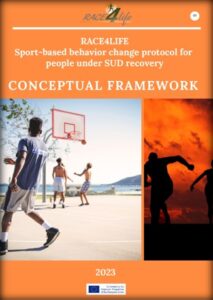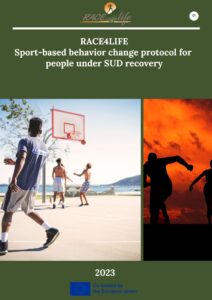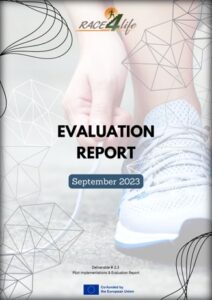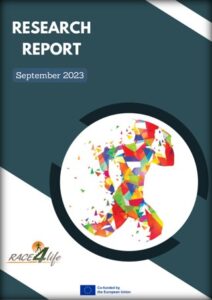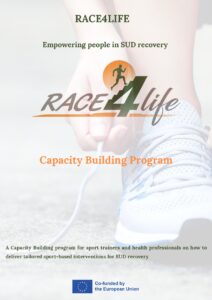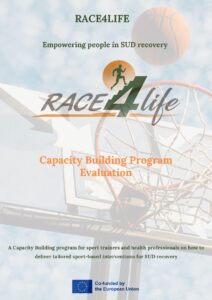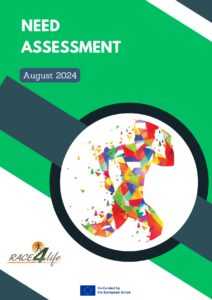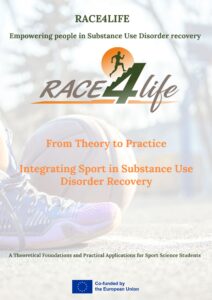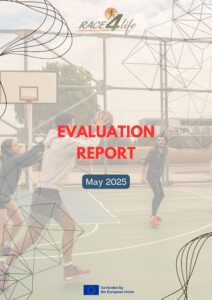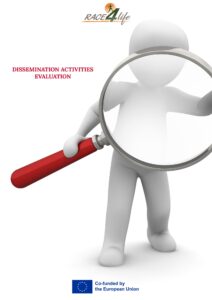Project Outputs
1. Building a Comprehensive Framework for Understanding and Investigating Behavioral Change
A conceptual framework was developed to achieve a comprehensive understanding of the key concepts of behavioral change and the relationships between them that required study. In this context, a multifaceted conceptualization of behavior change was described, drawing on resources such as lived experiences, existing literature, and foundational theories. This framework served as a foundational step in exploring the complex dynamics of behavior change, ensuring that the RACE4LIFE project was grounded in both theoretical rigor and practical insights. It provided a structured approach to identifying and analyzing the core components and mechanisms influencing behavior, paving the way for a deeper investigation into the subject.
Read more about the conceptual framework
2. A Multidisciplinary Approach to Sport-Based Interventions for SUD Recovery
The RACE4LIFE protocol promotes tailored sport-based interventions for Substance Use Disorder (SUD) recovery by bridging exercise and mental health professionals in a multidisciplinary approach. While equipping exercise professionals with the skills to engage this vulnerable population is vital, fostering collaboration and training for mental health professionals in exercise fundamentals is equally crucial. Grounded in theoretical models and evidence-based behavior change techniques, the protocol seeks to change professional practices, ensuring exercise is integrated into daily routines to maximize therapeutic benefits. This holistic approach emphasizes mutual clarity on goals to enhance adherence and improve recovery outcomes.
Read more about the RACE4LIFE protocol and its innovative strategies for SUD recovery
Discover more about the RACE4LIFE protocol on the e-platform HERE
3. Evaluating the RACE4LIFE Protocol: A Dual-Level Approach
The evaluation of the of RACE4LIFE protocol aimed to assess its practicality, relevance, and effectiveness for open use, using both a train-the-trainers model and sport-based pilot implementation. The train-the-trainers evaluation applied the Kirkpatrick Model to measure training effectiveness across four levels: reaction, learning, behavior, and results, ensuring trainers could effectively apply their skills. The pilot implementation evaluation employed the COM-B model, examining how capability, opportunity, and motivation influenced clients’ adoption of behavior change in real-world settings. These insights were critical in refining the protocol for impactful application.
Read more about the evaluation
4. Integrating Sport into SUD Recovery: A Collaborative Approach
Health professionals working in Substance Use Disorder (SUD) recovery can significantly enhance long-term abstinence by incorporating sport as a therapeutic tool. This study, conducted across five European countries from August to September 2023, explored the potential of tailored sport-based interventions in recovery settings. Using a multi-method approach guided by the COM-B model (Capability, Opportunity, Motivation, and Behavior), the research collected quantitative and qualitative data from professionals in SUD recovery. Respondents evaluated the effort, importance, and value of sport-based practices and reflected on the benefits of collaboration between therapists and sport trainers in fostering life skills through sport. The findings underscore the importance of integrating sport into recovery programs and fostering interdisciplinary collaboration to maximize impact.
Read the Report
5. Bridging the Gap in Sports-Based Interventions for SUD Recovery
The integration of sports-based interventions into Substance Use Disorder (SUD) recovery programs faces challenges due to a lack of evidence-based practices and health professionals’ limited expertise in designing effective interventions. The RTS+ project highlighted this knowledge gap, leading to the development of the RACE4LIFE Capacity-Building program and its e-platform. This initiative provides comprehensive training on theoretical frameworks and practical protocols for implementing personalized sports-based behavior change interventions. By equipping mental health and sports professionals with essential tools, the program aims to enhance recovery outcomes, foster behavioral change, and promote holistic well-being among individuals recovering from SUD.
Read more about the Capacity-Building program
Discover more about the Capacity-Building Program on the e-platform HERE
6. RACE4LIFE Capacity Building Program: Implementation and Evaluation Insights
The RACE4LIFE Capacity Building program underwent a comprehensive evaluation using Kirkpatrick’s model to assess its practicality, relevance, reliability, and scalability. This mixed-method approach analyzed participant experiences, knowledge acquisition, behavior change, and outcomes, producing actionable insights for continuous improvement. The evaluation highlighted the program’s readiness for broader implementation, identifying strengths and areas for enhancement to ensure its effectiveness in diverse contexts. By adhering to a robust framework and emphasizing iterative refinement, the evaluation laid a solid foundation for the program’s global deployment and alignment with evolving capacity-building needs.
Discover more about the Capacity Building Program
7. Designing a Blended Learning Module for Sport Science Students
The RACE4LIFE project aims to create an innovative blended learning module for sport science students, focusing on sport-based interventions in Substance Use Disorder (SUD) recovery. A thorough needs analysis underpins the module’s development, ensuring alignment with students’ educational and professional goals. By assessing learners’ existing competencies, identifying gaps, and prioritizing essential skills, the project ensures a targeted, academically rigorous, and practical curriculum. This module will equip students to effectively plan and implement sport-based interventions, addressing the specific demands of SUD recovery with confidence and competence.
Read more about the Sport Science University Student’s Needs Assessment Analysis
8. Theoretical Foundations and Practical Applications for Sport Science Students
The RACE4LIFE innovative blended learning module for sport science students bridges theory and practice in using sport as a tool for Substance Use Disorder (SUD) recovery. Students explore addiction models, recovery frameworks, motivational dynamics, behavioral change theories, and life skills development through an interdisciplinary approach. Combining evidence-based research with practical applications—such as the RACE4LIFE protocol—participants design, implement, and evaluate sport-based interventions that foster resilience, social reintegration, and well-being in diverse recovery settings.
9. Enhancing Sports Education: RACE4LIFE Learning Module Evaluation
The pilot implementation and evaluation of the RACE4LIFE learning module assessed its quality, relevance, and impact on sport science students. Using both scaled and open-ended questions, the evaluation identified strengths, improvement areas, participant satisfaction, and learning outcomes. The findings informed curriculum refinement, instructional strategies, and trainer development, supporting the delivery of more effective and engaging future training sessions
10. Evaluating the Impact of Sport-Based Recovery for Substance Use Disorder
RACE4LIFE used sport as a powerful tool to foster social inclusion, behavioral change, and personal growth for individuals recovering from Substance Use Disorder (SUD). Through capacity-building programs, pilot interventions, webinars, and transnational collaboration, the project equipped sports trainers, educators, and students with the skills to design effective, inclusive, and sustainable recovery-focused activities. With a strong evaluation framework, RACE4LIFE ensured lasting impact, generating valuable knowledge to advance sport-based recovery methods across Europe.
